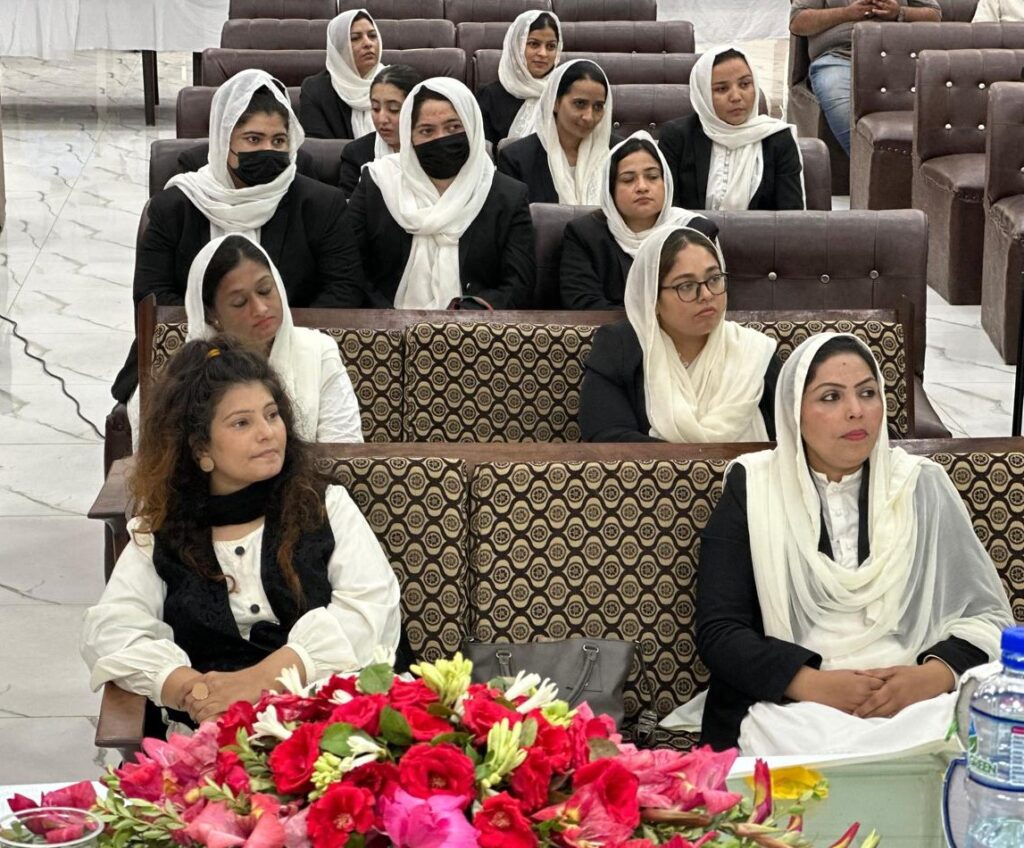
Empowering Female Lawyers: A Step towards Gender Parity in the Judiciary
On September 25, 2024, the Sungi Development Foundation (SDF), in partnership with UN Women, organized a transformative one-day introductory session at the High Court Bar Association Rawalpindi. This session aimed to guide and motivate aspiring female lawyers to take the next step in their legal careers by preparing for the Civil Judge’s exams.

The initiative is part of a broader project under the Gender Parity in Justice Sector Institutions (JSI), a collaborative effort between SDF and UN Women to address the gender imbalance in Pakistan’s judicial and law enforcement sectors. This project aligns with the global mission of UN Women, which advocates for gender equality and women’s empowerment across all sectors, including law and governance.
The session was designed with a clear vision: to increase female representation in the judiciary by equipping women with the knowledge, strategies, and confidence needed to successfully pass the Civil Judge’s exams. Currently, the judicial sector in Pakistan remains male-dominated, and this initiative sought to challenge and change that by empowering female lawyers to step into leadership roles. This was not just about exam preparation but about shaping future leaders in Pakistan’s legal system. Women in positions of authority, such as judges, can bring unique perspectives and drive the judiciary toward a more equitable and inclusive system.

A total of 38 female participants attended the session, demonstrating the strong interest and demand for such initiatives. This exclusive focus on female lawyers emphasized the critical need for gender-specific support and highlighted the session’s commitment to fostering gender parity. The program aimed to inspire these women not only to pass the exams but also to realize their potential as change-makers in the justice system. By increasing the number of female judges, the judiciary can better reflect the diversity of the population it serves, making the legal system more just and accessible for all.
The session was led by Sohail Shafiq Touqeer Khan and Malik Jawad, who provided invaluable insights into the mechanisms, eligibility criteria, and process of joining the judiciary. They broke down the exam structure, offering detailed advice on how to effectively prepare for the exams and manage the high-pressure environment of the civil judge examinations. The trainers emphasized the importance of paper-attempting techniques, a critical skill for passing competitive exams. Additionally, participants were informed about future training opportunities that would be provided by SDF, ensuring that they remain supported throughout their journey to becoming civil judges.

In addition to exam preparation, the session also focused on the broader importance of female representation in the judiciary. It was made clear that having more female judges is not just about numbers, but about fostering inclusive decision-making and ensuring that the judiciary better represents the diverse population of Pakistan. Female judges bring essential perspectives, especially in cases related to women’s rights, family law, and gender-based violence, areas where a more empathetic and gender-sensitive approach is crucial. The trainers and participants discussed how the presence of women in the judiciary can influence policy and legal precedents in ways that benefit society as a whole.
Looking forward, the Sungi Development Foundation and UN Women plan to build on the success of this introductory session with a range of follow-up initiatives. These include comprehensive training programs, mentorship networks, and stronger collaborations with legal institutions to support female lawyers preparing for the Civil Judge’s exams. Such initiatives are essential for maintaining momentum and ensuring long-term impact. SDF’s commitment to gender parity in the legal sector does not end with a single session. Instead, this event marks the beginning of an ongoing effort to transform Pakistan’s judiciary by empowering women at all levels.

Future steps will also involve regular follow-up sessions to monitor participants’ progress and address any challenges they may face during their preparation. Awareness campaigns and **resource development** initiatives will be used to further encourage gender parity in the judiciary. SDF also plans to collaborate with more legal institutions to provide hands-on experience and professional guidance to female lawyers, ensuring they are fully equipped to succeed in their exams and future careers. In conclusion, the One Day Introductory Session for Female Lawyers on the Pathway to Success in the Civil Judge’s Exams was a significant and timely intervention in Pakistan’s legal sector. It laid the foundation for creating a more gender-balanced judiciary by motivating and empowering female lawyers to pursue leadership roles within the judiciary. The session provided participants with both the technical knowledge and inspirational motivation they need to succeed in the Civil Judge’s exams. Through continuous support, training, and mentorship, SDF and UN Women are paving the way for more women to join Pakistan’s judiciary, ensuring that the legal system becomes more inclusive, representative, and just for all.

